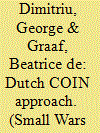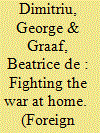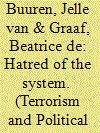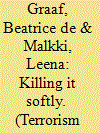|
|
|
Sort Order |
|
|
|
Items / Page
|
|
|
|
|
|
|
| Srl | Item |
| 1 |
ID:
099856


|
|
|
|
|
| Publication |
2010.
|
| Summary/Abstract |
Rarely has a military commitment led to such intense discussion in the Netherlands as the Task Force Uruzgan (TFU) mission in Afghanistan. In February 2010, the Netherlands' coalition government even collapsed after the two largest parties failed to agree on the withdrawal of Dutch troops from Afghanistan later this year. This article deals first of all with the difficult discussion over the Afghanistan mission of the TFU. The authors then subject three ISAF operations to close scrutiny. The authors provide some suggestions to help understand better this pivotal point in the execution of the whole operation and thus give a fuller picture of the Dutch counterinsurgency approach in Uruzgan.
|
|
|
|
|
|
|
|
|
|
|
|
|
|
|
|
| 2 |
ID:
145094


|
|
|
|
|
| Summary/Abstract |
This paper analyzes the Dutch deployment in Uruzgan between 2006 and 2010 with an eye to the challenge of garnering public support for protracted military missions abroad. The hypothesis is that public support can be shaped and sustained by strategic narratives regarding the use of force. Ringsmose and Børgesen's model on strategic narratives is discussed and tested, and expanded in two ways. First, by including the role of “counternarratives,” that is, of narratives presented by factions that oppose deployment decisions. Our data suggest that narrative dominance (the combination of narratives and counternarratives) accounts for the waxing and waning of public support for a given mission. Second, the nexus between negative narrative dominance and the ensuing drop of public consent will be teased out. Using the notion of “elite responsiveness,” we demonstrate when and how weak strategic narratives trigger a political fallout.
|
|
|
|
|
|
|
|
|
|
|
|
|
|
|
|
| 3 |
ID:
132368


|
|
|
|
|
| Publication |
2014.
|
| Summary/Abstract |
In this article, the violent threat emerging from "menacing loners" and autonomous cells in The Netherlands is being historicized and contextualized by providing quantitative and qualitative insight into this threat and illuminating some of the most dramatic incidents. Although beyond the core purpose of this mainly empirical article, some tentative remarks will be presented as possible explanation for both continuity and change. We argue that the shift from political violence originating from groups and networks to political violence perpetrated by individuals, and the shift from ideologically motivated violence to performative violence, are both shifts within a continuum, not radical breaks with the past. It is a difference in degree. Further, we argue that these gradual shifts in types of violence can only be understood as dependent on parallel manifestations of counter-policies, technological developments, and broader trends within society, rather than as attributable to indigenous terrorist developments as such. We postulate a shift from ideologically motivated to performative violence, resulting to a large extent from the possibilities offered by the Internet and social media, and from a broader cultural trend defined as the emergence of the "casting society."
|
|
|
|
|
|
|
|
|
|
|
|
|
|
|
|
| 4 |
ID:
099661


|
|
|
|
|
| Publication |
2010.
|
| Summary/Abstract |
This article seeks to provide a comprehensive analysis of the early demise of Rode Jeugd's initiatives towards a terrorist campaign in the Netherlands. It is concluded that three contextual factors played a crucial role in the process: the openness of the political culture, the setbacks experienced by similar organizations elsewhere (RAF in particular), and the lack of overt repression, combined with effective covert operations carried out by the security forces against the Rode Jeugd. Overall, the case of Rode Jeugd is a prime example of a demonstration of state power not always being the most efficient or even suitable method to combat terrorism.
|
|
|
|
|
|
|
|
|
|
|
|
|
|
|
|
|
|
|
|
|